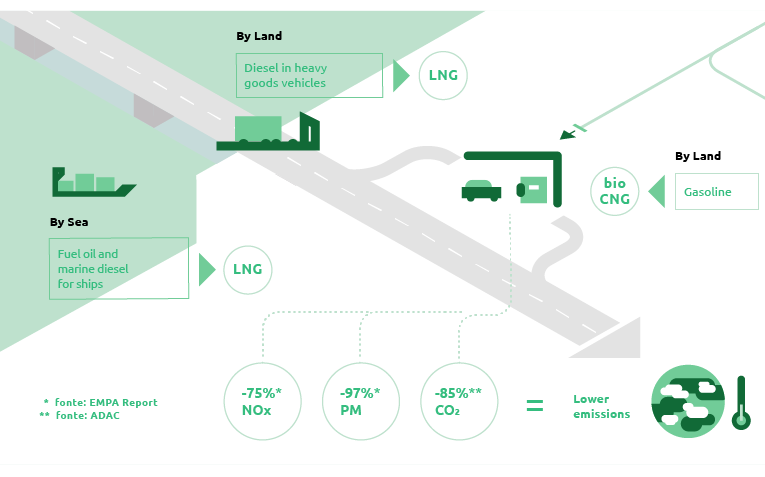Driving the energy of the future: Sustainable mobility
The dissemination of natural gas in the transport sector and the integration of biogas and biomethane will play a crucial role in supporting the domestic economic growth and in fighting climate change, in a global transition process that is rapidly moving towards decarbonised economies.
The ease of transporting and storing natural gas allows the development of multiple projects linked to the deployment of compressed natural gas (CNG) for road transportation and liquefied natural gas (LNG) used in heavy land and sea transport. In addition, biomethane can also be compressed, liquefied, transported and used as a renewable fuel.
Alongside the development of low emission fuels, Snam’s commitment outlined in its Business Plan will lead it to upgrade the existing infrastructure in order to expand the network of natural gas refuelling stations. This objective will also be achieved through partnerships with other players in the industry, like the previously mentioned acquisition of Cubogas, engaged in the business of natural gas compressors for sustainable mobility.
Liquefied natural gas (LNG): a solution for reducing maritime and heavy transport emissions
LNG is produced starting with natural gas, which is cooled and compressed until it reaches a liquid state. In this form the gas can be easily stored and transported, and importing it by sea allows a further diversification of sources of procurement, with positive effects on national energy security.
The LNG can be used in traditional plants or as an alternative to other fossil fuels for automotive and sea transport, replacing diesel, fuel oil or marine diesel oil.
The use of LNG instead of diesel has significant environmental advantages with a considerable reduction in emissions both in terms of climate changing gases and local pollutants, specifically in the case of the use of methane produced from renewable sources.
Alternative to traditional fuels

Compressed natural gas (CNG) for automotive transport: an effective response to the transport-related air pollution
83
new cars
powered by natural gas
in the Snam car fleet
The natural gas transported in the Snam network can be compressed and used as an alternative to traditional fossil fuels for cars, lorries and buses. The use of CNG instead of petrol and diesel fuel has considerable environmental advantages: compared with traditional fuels, CNG allows a reduction in the CO2 emissions of around 33% (85% if from biomethane), nitrogen oxide (NOx) emissions of around 75% and particulate matter of around 97%. With a good extensive network of methane pipelines, which allows the transportation of CNG with very little impact on the environment and vehicle traffic, Italy is already the European market leader for methane consumption for automotive transport, with over one billion cubic metres consumed in 2017 and around one million vehicles currently on the roads.
During the year Snam ratified the agreements and partnerships with the goal of promoting sustainable mobility throughout the country.
At the annual Partners’ Day, Snam and the Spanish car manufacturer SEAT signed a strategic agreement for the technological development and expansion of compressed natural gas and biogas refuelling facilities for sustainable mobility. This partnership will see Snam committed to the creation of an innovative infrastructure and the development, by SEAT, of new models of cars running on methane. The agreement concluded involves the commitment, by the two companies, to exploring development opportunities and initiatives aimed at retailers, commercial customers and car owners to promote the natural gas refuelling network and identify initiatives for the technological development of biomethane. The sharing of Italian, French and Austrian market strategies will enable SEAT and Snam to create synergies for the expansion of the CNG and bio-CNG market as alternatives to traditional fuels.
Under the scope of the promotion of sustainable mobility in Italy, in 2018 Snam was involved in the upgrading of the existing infrastructure necessary for the development of the CNG and LNG markets. In order to expand the network of refuelling stations for vehicles running on natural gas, during the year the Company made two important deals with two important players in the transport sector: Eni and API. Through its subsidiary Snam4Mobility, Snam is committed to developing the infrastructure for the use of natural gas in the transportation sector. In particular, in 2017 it signed the first agreements with different counterparts to develop 50 fuel stations (2 LNG and 48 CNG stations), including the first two batches for a total of 34 refuelling stations within the national Eni network of gas stations. 6 of the sales outlets in the contracts are already in service. Snam reached an agreement with the API Group for the creation of around 200 new natural gas and biomethane refuelling facilities, which will be included in the Italian IP fuel sales outlets. These refuelling stations will have gas compression systems produced by the subsidiary Cubogas. Snam’s goal is to create over 250 new distributors on a national scale, which will be part of the existing network in Italy, to better balance the deployment in the different regions of the Country.